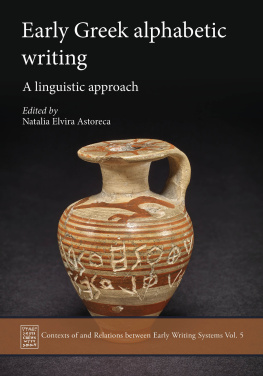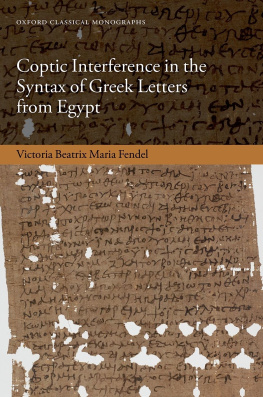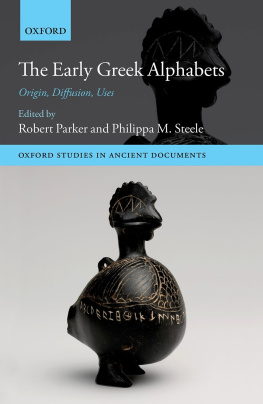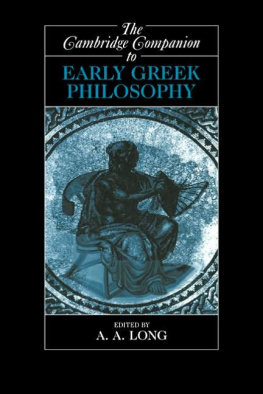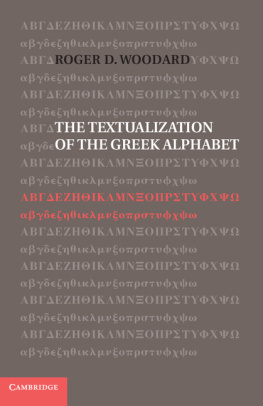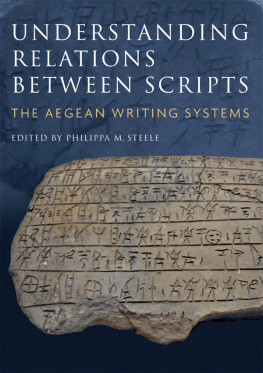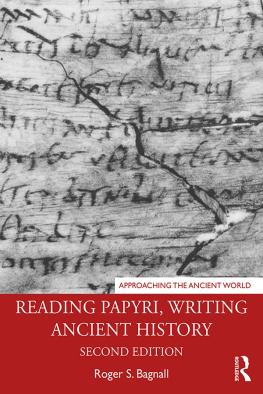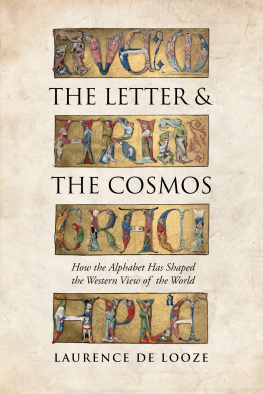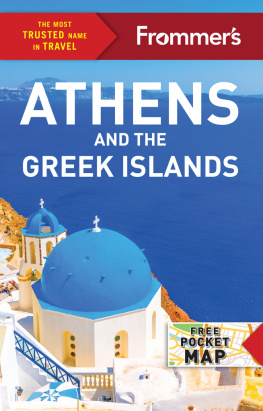

Published in the United Kingdom in 2021 by
OXBOW BOOKS
The Old Music Hall, 106108 Cowley Road, Oxford, OX4 1JE
and in the United States by
OXBOW BOOKS
1950 Lawrence Road, Havertown, PA 19083
Oxbow Books and the author 2021
Hardback edition: ISBN 978-1-78925-743-4
Digital Edition: ISBN 978-1-78925-744-1
A CIP record for this book is available from the British Library
Library of Congress Control Number: 2021942125
An open-access on-line version of this book is available at: http://books.casematepublishing.com/Early_Greek_Alphabetic_Writing.pdf. The online work is licensed under the Creative Commons Attribution 3.0 Unported Licence. To view a copy of this license, visit http://creativecommons.org/licenses/by/3.0/ or send a letter to Creative Commons, 444 Castro Street, Suite 900, Mountain View, California, 94041, USA. This licence allows for copying any part of the online work for personal and commercial use, providing author attribution is clearly stated.
Some rights reserved. No part of the print edition of the book may be reproduced or transmitted in any form or by any means, electronic or mechanical including photocopying, recording or by any information storage and retrieval system, without permission from the publisher in writing.
Materials provided by third parties remain the copyright of their owners.
Printed in Malta by Melita Press
For a complete list of Oxbow titles, please contact:
UNITED KINGDOM
Oxbow Books
Telephone (01865) 241249
Email:
www.oxbowbooks.com
UNITED STATES OF AMERICA
Oxbow Books
Telephone (610) 853-9131, Fax (610) 853-9146
Email:
www.casemateacademic.com/oxbow
Oxbow Books is part of the Casemate Group
Front cover: Aryballos, Proto-Corinthian, Campania, Etruria The Trustees of the British Museum
Contents
A mis padres, Izaskun y Luis,
Por hacer de m un espritu libre.
A la memoria de Engracia Segura.
Acknowledgements
This work was funded as part of the project Contexts of and Relations between Early Writing Systems (CREWS). This project has received funding from the European Research Council (ERC) under the European Unions Horizon 2020 research and innovation programme (grant agreement No. 677758).
I would like to start by thanking the ERC and the CREWS project members and visiting fellows for the opportunity to work in such a positive research environment. I am also deeply grateful to my PhD supervisors, Dr Philippa M. Steele and Dr Torsten Meiner, for their constant feedback and support, and to Prof. James Clackson for his guidance and advice. I am thankful as well to others who have read this work at some stage: Dr Rupert Thompson, Dr Karin W. Tikkanen, Dr Robert Crellin, Dr Mark Darling, Dr Michael Loy and Juan Garca Gonzlez. Of course, I alone remain responsible for all the views and errors in this book.
This work would not have been the same without the contribution of the Henry Carrington and Bentham Dumont Koe Scholarship and the economic help of Jesus College and the Faculty of Classics of the University of Cambridge. Thanks to them I took part in many conferences around the world and conducted my research in Greece for 5 months. The help of the staff at the British School in Athens, and especially of Tania Gerousi, was invaluable during my stay. I would also like to thank the staff of the museums and ephorates that allowed me to study their materials: the National Archaeological Museum, the American School in the Athenian Agora Museum, the archaeological museums of Paros, Delos, Kalymnos and Samos, and the ephorates of Athens, Cyclades, Dodecanese and Samos & Ikaria. I would like to give a special mention to Dr Jan-Marc Henke; without him I could not have found the abecedarium from Samos.
I will now address other individuals who, although not directly connected to my doctoral education in Cambridge or the elaboration of this dissertation, have contributed in other ways. Prof. Anna Panayotou-Triantaphyllopoulou and Prof. Araceli Striano Corrochano deserve a special mention here. I consider them my mentors and I would not have done this thesis if it were not for their help and guidance when I began to study other writing systems. I am also grateful to Dr Violeta Gomis Garca for sharing her knowledge on the Cycladic inscriptions.
I would also like to thank all my friends in the Faculty of Classics and Jesus College for making my time here more enjoyable. I am especially grateful to my dear friends Dr Ester Salgarella and Dr Sandra Cruz Gutirrez, who were my biggest support in Cambridge. I do not forget all my friends in Athens and my M55 mates, who make me feel at home every time I go back. To my colleague and companion in the East, Dr Michael Loy, now Assistant Director of the BSA, I cannot thank him enough for his friendship, his generosity and all the fun and emotive moments that we have spent together.
I hope that the reader will forgive me for addressing now my family and loved ones in their mother tongue:
Gracias a Juan, que ha sido mi compaero durante los aos que ha llevado esta tarea. Aunque en ocasiones haya sido desde la distancia, su cario y su apoyo siempre me han ayudado a seguir. Gracias a sus padres y a su hermano tambin, por acogerme con calidez y paciencia, y hacer que sienta que tengo una segunda familia cada vez que vuelvo a Madrid.
A mi familia ateniense le agradezco su compaa durante mi estancia en Grecia. Si no fuera por ellos y mis visitas desde nia a su maravilloso pas, probablemente jams habra elegido este camino. Quiero agradecer especialmente a mi ta Engracia por todo el cario que me ha dado. Es la mujer ms fascinante que he conocido y siempre ser un modelo para m. Me apena enormemente que no haya podido ver el resultado de mi trabajo, ni mis prximos pasos en la vida, pero me consuela saber que tuvo una buena vida y que ahora descansa en paz.
Esta tesis se la dedico, por encima de todo, a mis padres, que tanta importancia le han dado a mi educacin y que tanto han aportado para ello. Gracias por no negarme nada, por haberme dado independencia y haber apoyado siempre las decisiones que he tomado en mi carrera acadmica, aunque estas no hayan sido las ms corrientes. Jams pusisteis en duda que siguiera mi pasin, a pesar de ser una disciplina poco familiar para vosotros, ni mi capacidad para conseguir cualquier cosa que me propusiera. Adems, vuestro apoyo y comprensin no han tenido lmites, incluso cuando mis decisiones han supuesto estar lejos de vosotros durante mucho tiempo. Si he llegado hasta aqu ha sido gracias a vosotros, y este trabajo es el fruto de toda la educacin y el apoyo que me habis dado. Por eso este libro es tambin vuestro.
Abbreviations
AEph :
Arena IV = Arena 1994
Ath. Ag. = Lang 1976
BCH Bulletin de Correspondence Hllenique
CL Compensatory Lengthening
CEG = Hansen 1983
Daphnephoros = Kenzelmann Pfyffer, Theurillat and Verdan 2005.
EG = Guarducci 1995
ET = Rix et al. 2014
Hymettos = Langdon 1976
IC Inscriptiones Creticae
IG Inscriptiones Graecae
IvO = Dittenberger and Purgold 1896
Kalapodi = Palme-Koufa 1996
Kommos = Csapo, Johnston and Geagan 2000
Lefkandi = Jeffery 1980
LGPN = Fraser et al. 19872014
LSAG = Jeffery and Johnston 1990
Methone = Besios, Tzifopoulos and Kotsonas 2012
ML Matres Lectionis
NEM Northeast Mediterranean
NWS Northwest Semitic
Smyrna = Jeffery 1964
Next page
